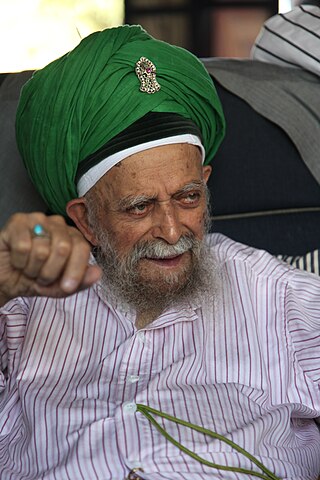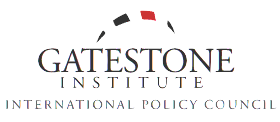Related Research Articles

Daniel Pipes is an American former professor and commentator on foreign policy and the Middle East. He is the president of the Middle East Forum, and publisher of its Middle East Quarterly journal. His writing focuses on American foreign policy and the Middle East as well as criticism of Islamism.

Islam is the third-largest religion in the United States (1.34%) after Christianity (67%) and Judaism (2.4%). The 2020 United States Religion Census estimates that there are about 4,453,908 Muslim Americans of all ages living in the United States in 2020, making up 1.34% of the total U.S. population. In 2017, twenty states, mostly in the South and Midwest, reported Islam to be the largest non-Christian religion.

The Middle East Forum (MEF) is an American conservative 501(c)(3) think tank founded in 1990 by Daniel Pipes, who serves as its president. MEF became an independent non-profit organization in 1994. It publishes a journal, the Middle East Quarterly.

Muhammad Hisham Kabbani was a Lebanese-American Sunni Sufi Muslim scholar belonging to the Naqshbandi Sufi Order. Kabbani has counseled and advised Muslim leaders to build community resilience against violent extremism. In 2012, the Royal Islamic Strategic Studies Centre named him on The 500 Most Influential Muslims. His notable students include the world-famous boxer Muhammad Ali and former Indonesian President Susilo Bambang Yudhoyono.

Nafs (نَفْس) is an Arabic word occurring in the Quran, literally meaning "self", and has been translated as "psyche", "ego" or "soul". The term is cognate with the Hebrew word nephesh, נֶפֶשׁ. In the Quran, the word nafs is used in both the individualistic and collective sense, indicating that although humanity is united in possessing the positive qualities of a nafs, they are individually responsible for exercising the agencies of the "free will" that it provides them.
Muzammil H. Siddiqi is an Indian-American Muslim writer who has been on the faculty of Chapman University.

Al-Qāsim ibn Muḥammad ibn Abī Bakr was a jurist in early Islam.

Maulana Shaykh Abdullah Faiz ad-Daghistani, also known as MaulanaShaykh Abdullah, was the 39th grand master of the Naqshbandi Haqqani golden chain of the Naqshbandi-Sufi order.

Mawlana Khâlid Sharazuri also known as Khâlid-i Baghdâdî and Mawlana Khalid was a Kurdish Sufi, and poet by the name of Shaykh Diya al-Dīn Khalid al-Shahrazuri, the founder of a branch of the Naqshbandi Sufi order - called Khalidi after him - that has had a profound impact not only on his native Kurdish lands but also on many other regions of the western Islamic world. His writings are among the earliest examples of prose and poetry in Central Kurdish.

Muhammad al-Hasan ibn Alawi ibn al-Abbas ibn Abd al-Aziz (1944–2004), also known as Muhammad ibn Alawi al-Maliki, was one of the foremost traditional Sunni Islamic scholar of contemporary times from Saudi Arabia. He is considered to be the Mujaddid of 20th-21st century.
Owais al-Qarani, also spelled Uways or Owais, was a Muslim from South Arabia who lived during the lifetime of the Islamic prophet Muhammad.
The First and Second International Islamic Unity Conference were conferences organized by followers of the Naqshbandi Haqqani Sufi Order in Los Angeles (1996) and Washington DC (1998). Sufi and Sufi-friendly Muslim representatives, Islamic scholars and politicians were invited to the conferences. The conferences exemplified the Haqqani-Naqshbandis' ambitions to establish itself as a major player within the American Muslim scene. The conference was supported in part by members of royalty, Muslim political and religious leaders from across the world.

The Uwaisī silsila or tariqa (pathway) is a form of spiritual transmission in the vocabulary of Sufism, named after Owais al-Qarani. It refers to the transmission of spiritual knowledge between two individuals without the need for direct interaction between them.

Naqshbandiyya Khalidiyya, Khalidiyya or Khalidi is the title of a branch of the Naqshbandiyya Sufi lineage, from the time of Khâlid-i Shahrazuri until the time of Shaykh Ismail ash-Shirwani.

As-Sunnah Foundation of America (ASFA) is an educational organization that works for the unity of the Islamic faith in the United States, founded and chaired by Hisham Kabbani. Founded in 1997, together with the Islamic Supreme Council of America (ISCA), the ASFA has close connections to Kabbani's Naqshbandi Haqqani Sufi Order. The ASFA is said be a main organization of Nakshbandi Sufi order in America.

Shaykh Muhammad Nazim Adil Al-Qubrusi Al-Haqqani, commonly known as Shaykh Nazim, was a Turkish Cypriot Sunni Muslim imam and one of the most influential members of the Haqqani stream of the Naqshbandi order (tariqa) of Sunni Islam.
Islamic extremism in the United States comprises all forms of Islamic extremism occurring within the United States. Islamic extremism is an adherence to fundamentalist interpretations of Islam, potentially including the promotion of violence to achieve political goals. In the aftermath of the September 11, 2001 terror attacks, Islamic extremism became a prioritized national security concern of the U.S. government and a focus of many subsidiary security and law enforcement entities. Initially, the focus of concern was on foreign Islamic terrorist organizations, particularly al-Qaeda, but in the course of the years since the September 11 terror attacks, the focus has shifted more towards Islamic extremist radicalized individuals and jihadist networks within the United States.

Gatestone Institute is an American conservative think tank based in New York City, known for publishing articles pertaining to U.S. foreign policy in the Middle East, specifically with regard to Islamic extremism. It was founded in 2012 by Nina Rosenwald, who serves as its president.John R. Bolton, former U.S. Ambassador to the United Nations and former National Security Advisor, was its chairman from 2013 until March 2018. Its current chairman is Amir Taheri. The organization has attracted attention for publishing false or inaccurate articles, some of which were shared widely.
Ziyarat Ashura is an Islamic salutatory prayer to God. The prayer is part of the liturgy used in pilgrimages to the shrine of Husayn in Karbala. Muhammad al-Baqir, Prophet's descendant and the fifth Shia Imam, recommended reciting Ziyarat Ashura on Ashura while facing Karbala, as a symbolic visit to the shrine.
Gibril Fouad Haddad is a Lebanese-born Islamic scholar, hadith expert (muhaddith), author, and translator of classical Islamic texts. He was featured in the inaugural list of The 500 Most Influential Muslims and has been called "one of the clearest voices of traditional Islam in the Western world", a "prominent orthodox Sunni" and a "staunch defender of the traditional Islamic schools of law." He holds ijazas from over 150 scholars across the Muslim world. He was a visiting fellow (2013-2015) then senior assistant professor (2015-2018) at the Sultan Omar Ali Saifuddin Center for Islamic Studies, Universiti Brunei Darussalam. He is also a staunch critic of Wahhabism and Salafism.
References
- 1 2 Jake Tapper, "Islam's flawed spokesmen Archived 2002-12-17 at the Wayback Machine ", Salon.com , 26 September 2001 (accessed 27 January 2007).
- ↑ Goodstein, Laurie (October 28, 2001). "A NATION CHALLENGED: THE CLERIC; Muslim Leader Who Was Once Labeled an Alarmist Is Suddenly a Sage". The New York Times .
- 1 2 Islamic Supreme Council, About Us, Our Mission
- ↑ ISCA website
- ↑ "ISCA Attends White House Ramadan Iftar Dinner - Chairman Shaykh Muhammad Hisham Kabbani Meets with President Bush". Archived from the original on August 29, 2008. Retrieved September 23, 2009.
- ↑ "DEFENSE'S CHAIRMAN OF THE JOINT CHIEFS OF STAFF DISCUSSES CONTEST OF IDEAS AT HUDSON INSTITUTE". Archived from the original on January 9, 2009. Retrieved September 23, 2009.
- ↑ Pipes, Daniel (November 2001). "The Danger Within: Militant Islam in America - Commentary" . Retrieved 27 January 2007.